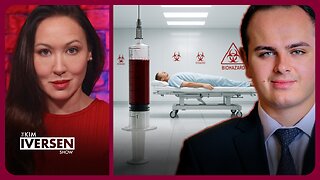Premium Only Content

7 in 10 concerned they won’t be able to understand the terminology their healthcare provider uses
Half (51%) of Americans with a healthcare provider are too afraid to ask them about their health condition or symptoms.
That’s according to a recent survey of 2,005 nationally representative Americans, which found more men than women dread this interaction (57% vs. 45%).
Seven in 10 (69%) are concerned they won’t be able to understand the terminology their healthcare provider uses.
And half worry their physician will be insulted or get angry if they push to find out more about their condition.
Conducted by OnePoll on behalf of PatientPoint, the survey also discovered 69% wish they knew how to describe their symptoms better before talking with their physician.
About two in five (39%) have felt anxious before going to a doctor’s appointment.
The reasons many have felt overwhelmed, anxious, or stressed? Thirty-nine percent worried about what they might find out and 38% felt they didn’t have enough information to help them prepare for their visit.
When at their physician’s office, more than a third (35%) said both the waiting room and exam room cause them anxiety, for similar reasons. Fifty-one percent said it takes too long to be called for their appointment in the waiting room, and 48% were stressed about wait times in the exam room itself.
Although 54% said they usually get the most information about their health from their physician or specialist, nearly half (48%) have left an appointment feeling confused.
Sixty-two percent want their doctor’s office to be more modern, with 78% wanting technology showcasing relevant education on their symptoms.
“Transforming the doctor’s office from intimidating to engaging begins by putting ourselves in the patient’s shoes in those critical, reflective moments while they wait to see their healthcare provider,” said Mike Collette, founder and chief executive officer at PatientPoint. “By leveraging technology to equip patients with the relevant education they want on their condition, we can empower them to speak up, ask questions and learn more about treatment options.”
Fifty-nine percent wish their healthcare provider gave them more educational materials on their symptoms, and 55% wish their physician spoke to them in more detail about treatments and medication.
When asked what would make the waiting room and exam room more comfortable, people favored being able to read or watch educational materials about their condition (47% and 48%).
“Waiting time is learning time, and knowledge is power,” said Collette. “Empowered patients make better decisions and better decisions mean better outcomes. The more we can provide relevant content to patients at the point of care and beyond, the more we can increase patient comprehension, improve compliance and help patients live healthier lives."
-
 0:57
0:57
SWNS
14 days agoWhy many men suffer from haircut anxiety
391 -
 1:02:27
1:02:27
Michael Franzese
3 hours agoFace to Face with a Former Chinatown Gangster Turned NYPD Detective
25.7K12 -
 1:31:25
1:31:25
The Confessionals
9 hours agoThe Queen of Heaven Exposed (Hathor, Lilith & Ancient Gods Return)
7.63K2 -
 LIVE
LIVE
LFA TV
15 hours agoLFA TV ALL DAY STREAM - TUESDAY 9/2/25
913 watching -
 LIVE
LIVE
LIVE WITH CHRIS'WORLD
6 hours agoLIVE WITH CHRIS'WORLD - IT WORKED IN D.C. & IT WILL WORK IN CHICAGO
128 watching -
 40:44
40:44
Ohio State Football and Recruiting at Buckeye Huddle
5 hours agoOhio State Football: 10 Things We Learned From Rewatching the Texas Win
3.77K -
 DVR
DVR
Edge of Wonder
7 hours agoRemote Viewing 3I/ATLAS & Yellowstone’s Weird Anomalies
8.83K -
 1:08:47
1:08:47
TheCrucible
4 hours agoThe Extravaganza! EP: 30
78.2K11 -
 1:16:58
1:16:58
Kim Iversen
10 hours agoCOVID VACCINE HORROR: Fertility Destroyed & DNA Altered? | Nicolas Hulscher, MPH
44.1K111 -
 1:58:54
1:58:54
Wayne Allyn Root | WAR Zone
8 hours agoWAR Zone LIVE | 2 SEPTEMBER 2025
14.5K1